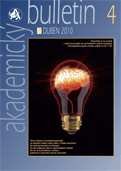Scientists from the Institute of Molecular Genetics of the Academy of Sciences in Czech Republic (IMG), in collaboration with several leading centers in the USA and the Netherlands, clarify the mechanism of transformation in one subtype of leukemia. Importantly, they identify substances that in a future might help to develop more effective treatments for this disease. The results of this study were published in the international journal Haematologica.
Acute myeloid leukemia (AML) is a cancer that arises in the bone marrow and affects normal
blood formation. AML is a rapid progressing disease, affecting myeloid stem and progenitor cells,
and alters the production of two important types of white blood cells (granulocytes and monocytes),
which protect the body from various infections. AML cells stop developing normally, they begin to
divide uncontrollably, and accumulate in the bone marrow. By the time the disease enters an acute
phase, these cells expand from the bone marrow into the blood stream.
AML is a heterogeneous disease classified into several subtypes based on the genetic profile,
clinical manifestations, prognosis and response to treatment. The standard treatment in AML is
based mainly on chemotherapy, which unfortunately kills tumor cells as well as normal cells, and in
addition presents a number of side effects. Tailored treatment to the different AML subtypes (for
instance based on genetic mutations) could significantly increase the chances of winning the battle
against this disease.
A frequent mutation that occurs in AML affects the gene encoding the transcription factor
C/EPBα (transcription factors are proteins necessary for transcription of the genetic information
encoded in the genes). The C/EPBα protein plays a major role in the differentiation of myeloid
progenitor cells in the bone marrow to healthy granulocytes. Mutations in C/EBPα protein can lead
to the generation of malignant leukemic cells.
Scientists from IMG have now identified a group of genes that are regulated by the protein
C/EPBα. Dr. Meritxell Alberich-Jorda and her colleagues showed that mutations in the gene C/EPBα
lead to suppressed expression of 33 genes important for normal development of myeloid stem cells.
This finding could of course lead the way to new treatments at least for some types of AML.
Researchers have indeed identified several compounds that at least partially restore the function
of those 33 genes, and halt the malignant transformation. These compounds are inhibitors of histone
deacetylase enzymes that regulate the function of genes during cell division and development.
Although in recent years these types of compounds have been tested on many tumor types, the
mechanism of their therapeutic effects were insufficiently elucidated. The results of the present
work of several scientific teams led by Dr. Meritxell Alberich-Jorda from IMG thus contribute to
the elucidation of these mechanisms at the molecular level and describe histone deacetylase
inhibitors as promising candidates for the treatment of one of the subtypes of AML.
More information can be found in the publication:
Liss A1, Ooi CH, Zjablovskaja P, Benoukraf T, Radomska HS, Ju C, Wu M, Balastik M, Delwel R,
Brdicka T, Tan P, Tenen DG, Alberich-Jorda M.
The gene signature in CCAAT-enhancer-binding protein α dysfunctional acute myeloid leukemia
predicts responsiveness to histone deacetylase inhibitors. Haematologica.
2014;99(4):697-705
Contact:
Meritxell Alberich-Jorda, Ph.D., Ústav molekulární genetiky AV ČR, v.v.i.; tel: 241062467,
e-mail:
alberichjorda@img.cas.cz
Tomáš Brdička, Ph.D., Ústav molekulární genetiky AV ČR, v.v.i.; tel: 241062589, e-mail:
tomas.brdicka@img.cas.cz
12 May 2014







Because Katareeya originates from a “third country”, namely, Australia, according to the Czech legislation she is not entitled to healthcare support from the public healthcare insurance.
More information...